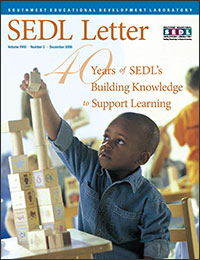SEDL's Disability Research to Practice Program Increases Knowledge, Improves Lives
SEDL is more than a research and development company—we’re a research, development, and dissemination company. We help people understand research-based information so they can use it in their own settings. Nowhere, perhaps, is our dissemination work more apparent than in our Disability Research to Practice program.
In 1983, SEDL received a $220,000 grant from the National Institute on Disability and Rehabilitation Research (NIDRR) to establish the Regional Rehabilitation Exchange (RRX). The RRX identified and promoted exemplary rehabilitation and independent living programs and practices in SEDL’s region and served as a model for four additional RRX projects. NIDRR continued to provide funding to SEDL for the next few years to operate other model programs.

In 1995, SEDL’s dissemination work took a new turn with the establishment of the National Center for the Dissemination of Disability Research, also funded by NIDRR. The goals of the NCDDR were twofold: 1) to ensure the widespread dissemination and utilization of research outcomes resulting from NIDRR research projects and 2) to increase the capacity of researchers to identify and use development and dissemination strategies that meet the needs of their target audiences. The NCDDR accomplished its goals through the production of resource guides, newsletters, trainings, modeling partnerships with researchers, and topic-centered portals and repositories accessible through its Web site. The NCDDR began its third cycle of funding in 2006. Its new scope of work responds directly to NIDRR’s concern for increasing the effective use of NIDRR-sponsored research results in shaping new technologies, improving service delivery, and expanding decision-making options for people with disabilities and their families.
Under the new funding, NCDDR is collaborating with two international organizations—the Campbell Collaboration and the Cochrane Collaboration—to establish a registry of evidence-based systematic reviews that address topics important to persons with disabilities, their families, and their service providers. The three organizations will also collaborate to provide training and technical assistance to researchers.
Systematic reviews provide information about the effectiveness of interventions by identifying, appraising, and summarizing the results of research using an approach that seeks to minimize bias. Dr. John Westbrook, program manager for SEDL’s NCDDR, says that systematic reviews are crucial to inform policy- and decision-making. He says, “They are also useful when there is uncertainty regarding the potential benefits of an intervention—they provide a synthesis of evidence from the research.”
As SEDL’s dissemination work evolves, Westbrook says, “The NCDDR will continue to work to help ensure that consumers and practitioners can access and use high-quality evidence-based knowledge on disability and rehabilitation issues. We understand that this knowledge can greatly impact—and improve—the lives of individuals with disabilities and their families, and we are committed to helping these individuals obtain the knowledge they need.”
Next Article: The 2000s: Rigor, Research, and Resilience

